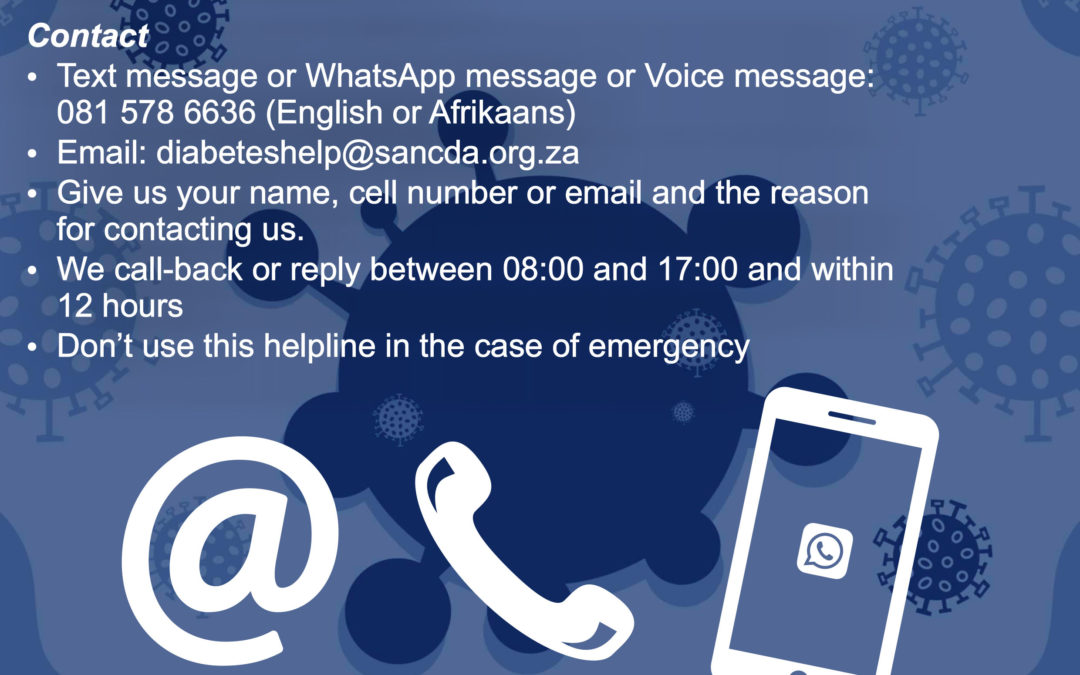
COVID-19 & NCDs
Infographics for you to use to help you manage your on NCDs condition during COVID-19.
These infographics, created with our partners, and used on the SANCDA helpline and used by the government.

Infographics for you to use to help you manage your on NCDs condition during COVID-19.
These infographics, created with our partners, and used on the SANCDA helpline and used by the government.
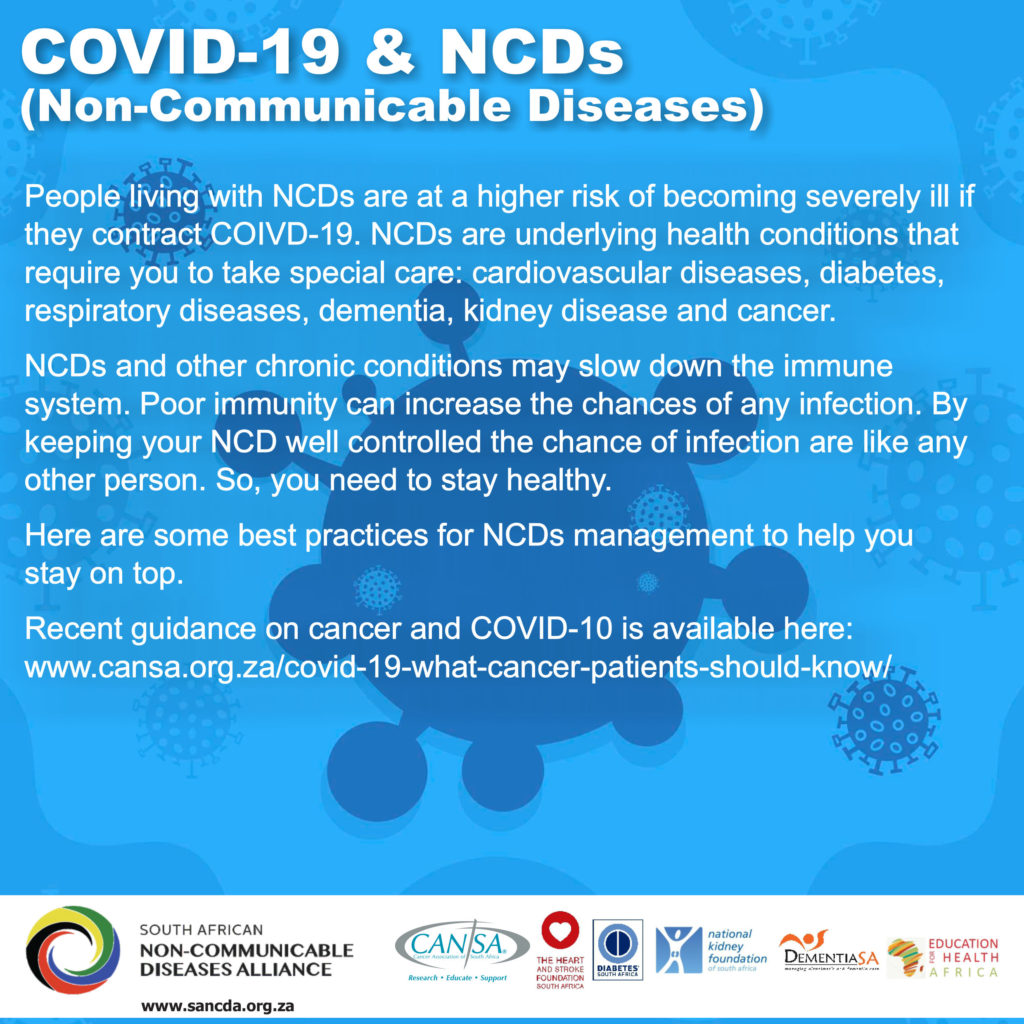
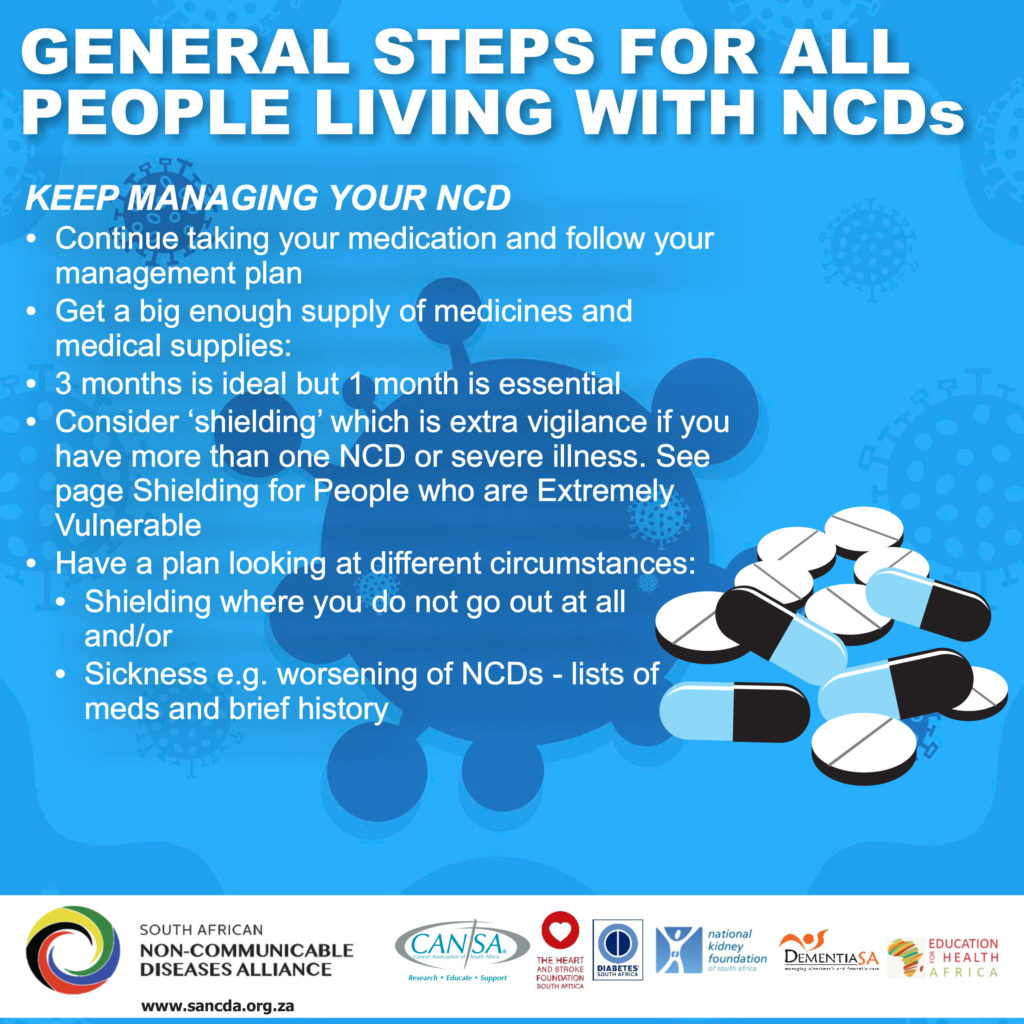
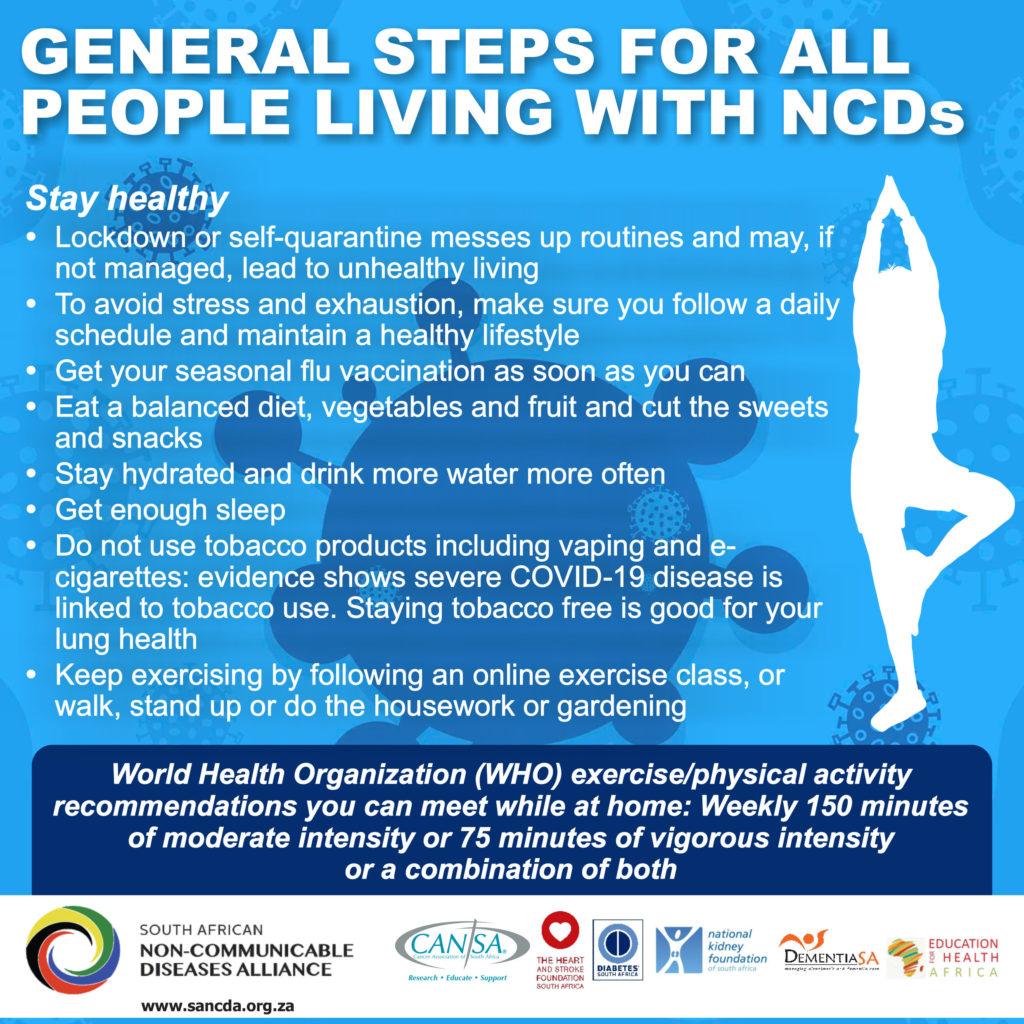
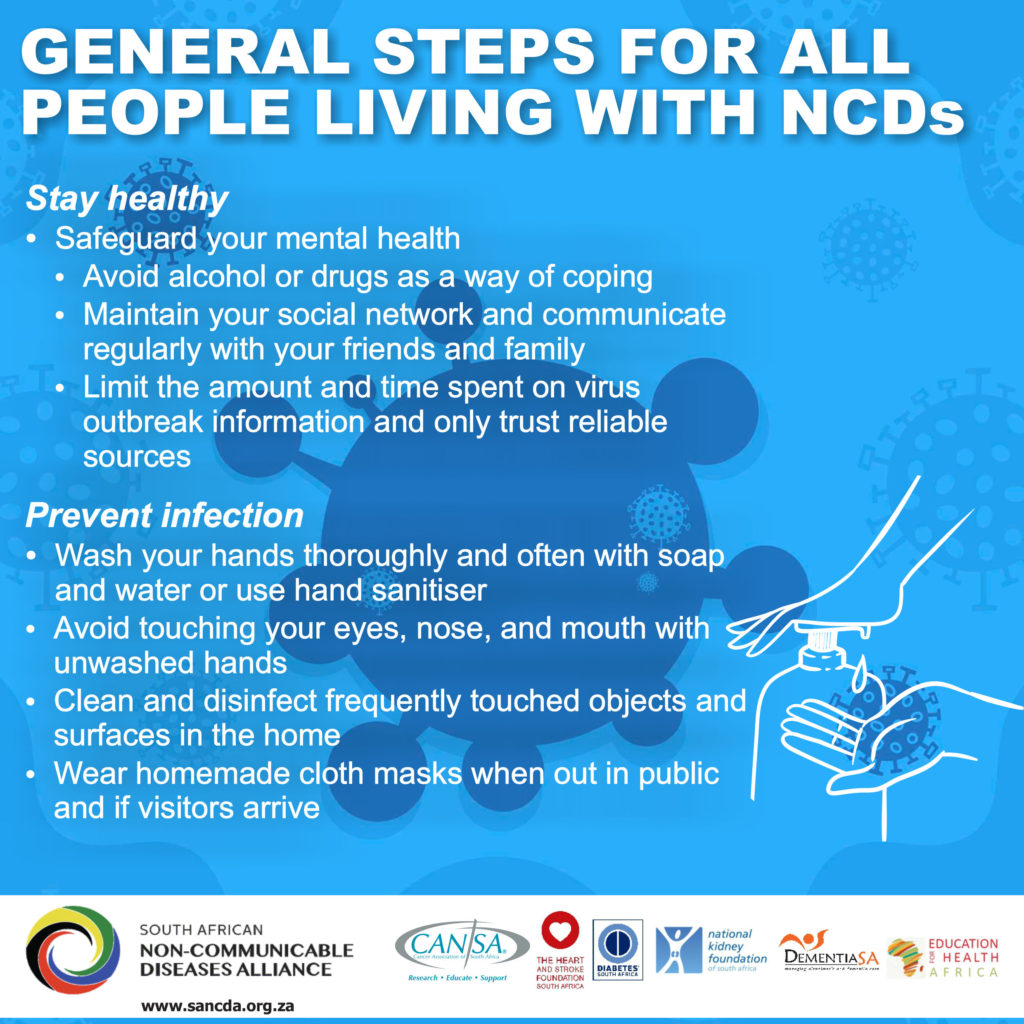
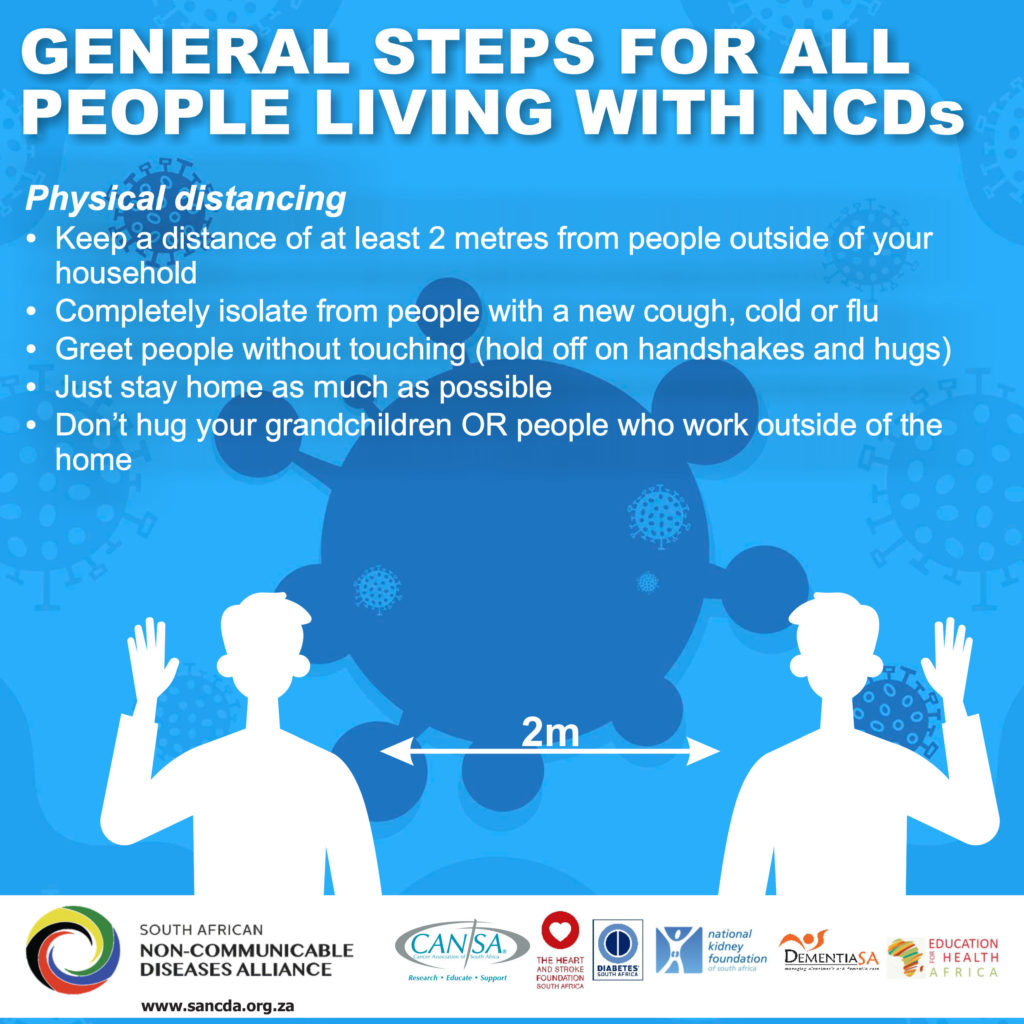
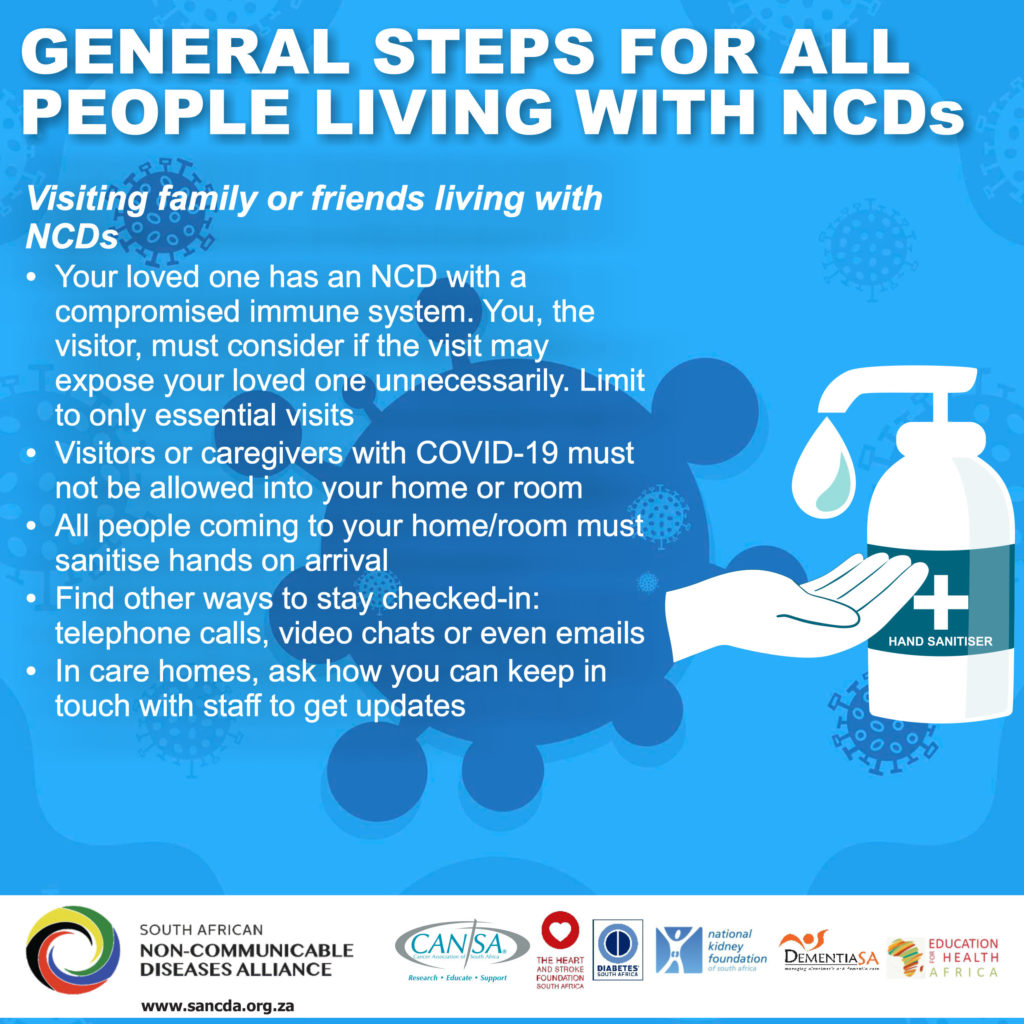
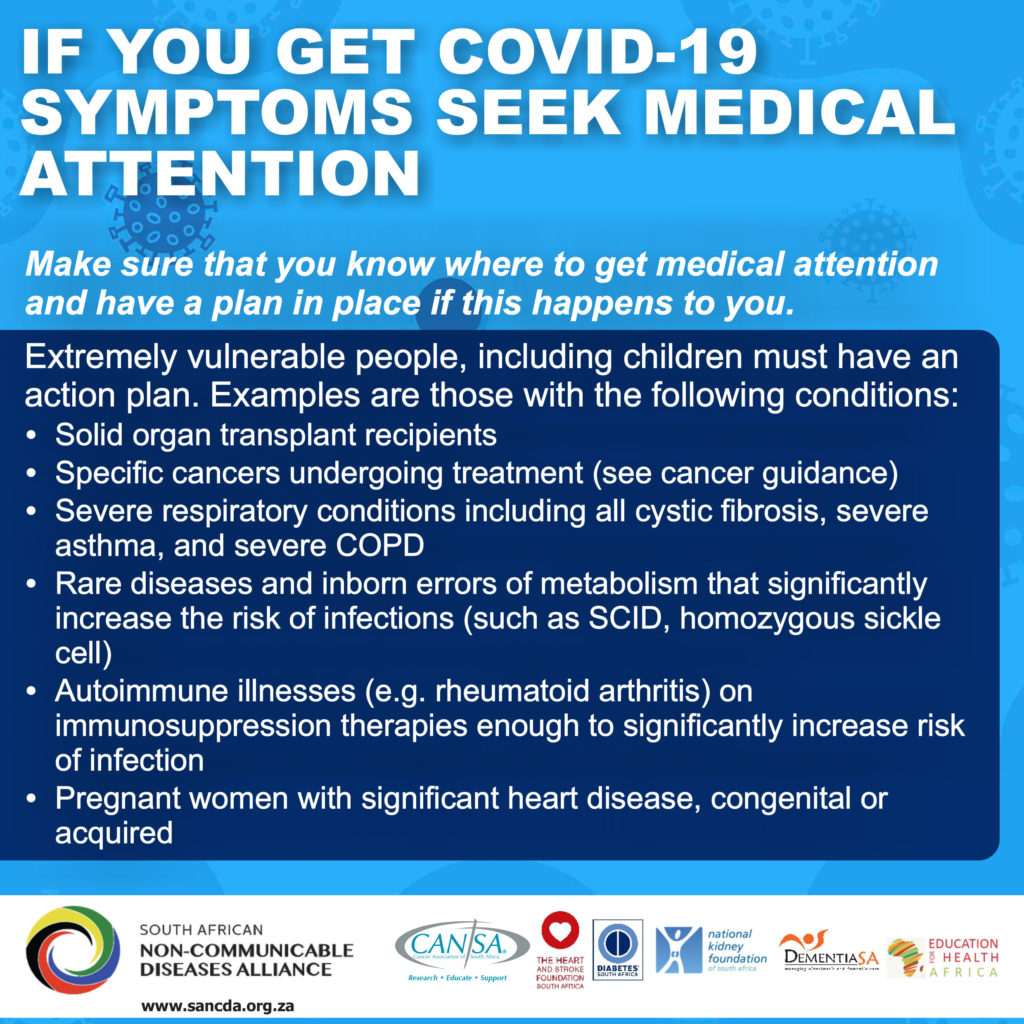
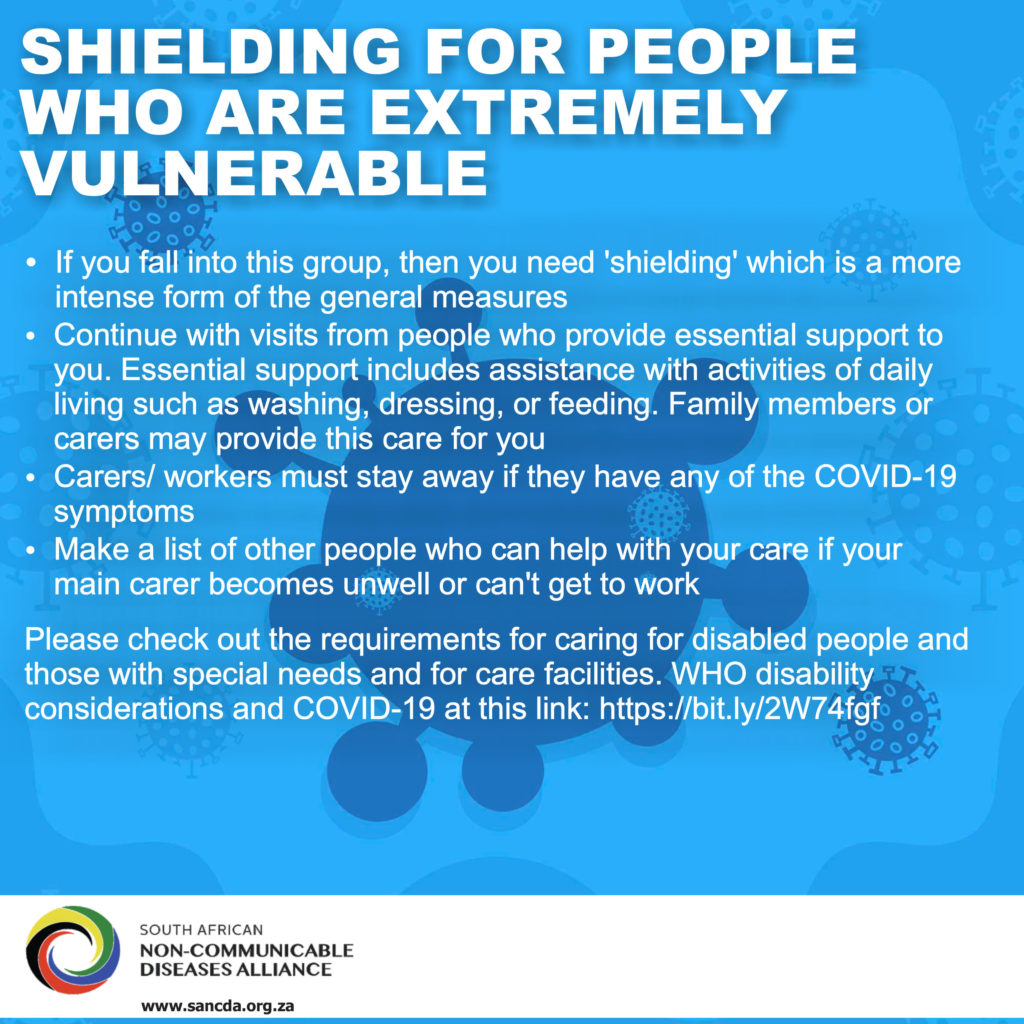
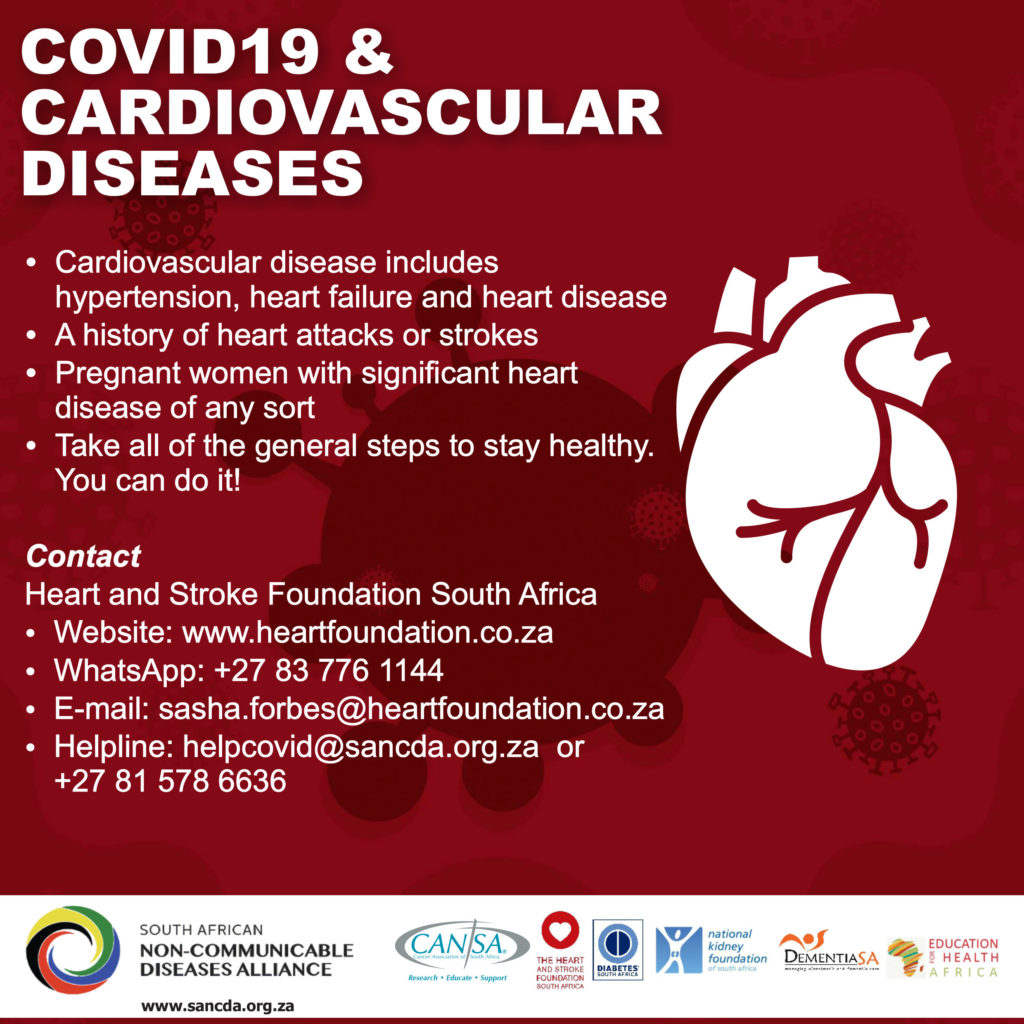
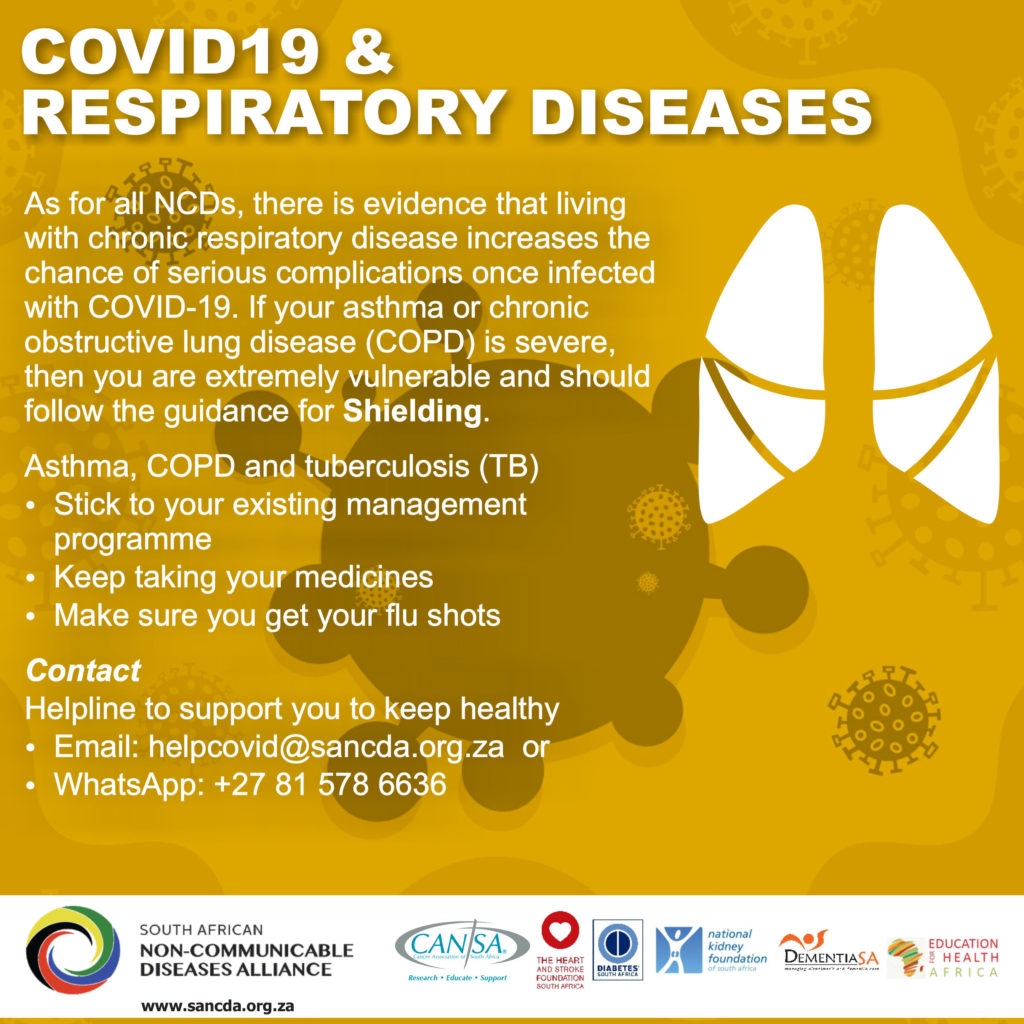
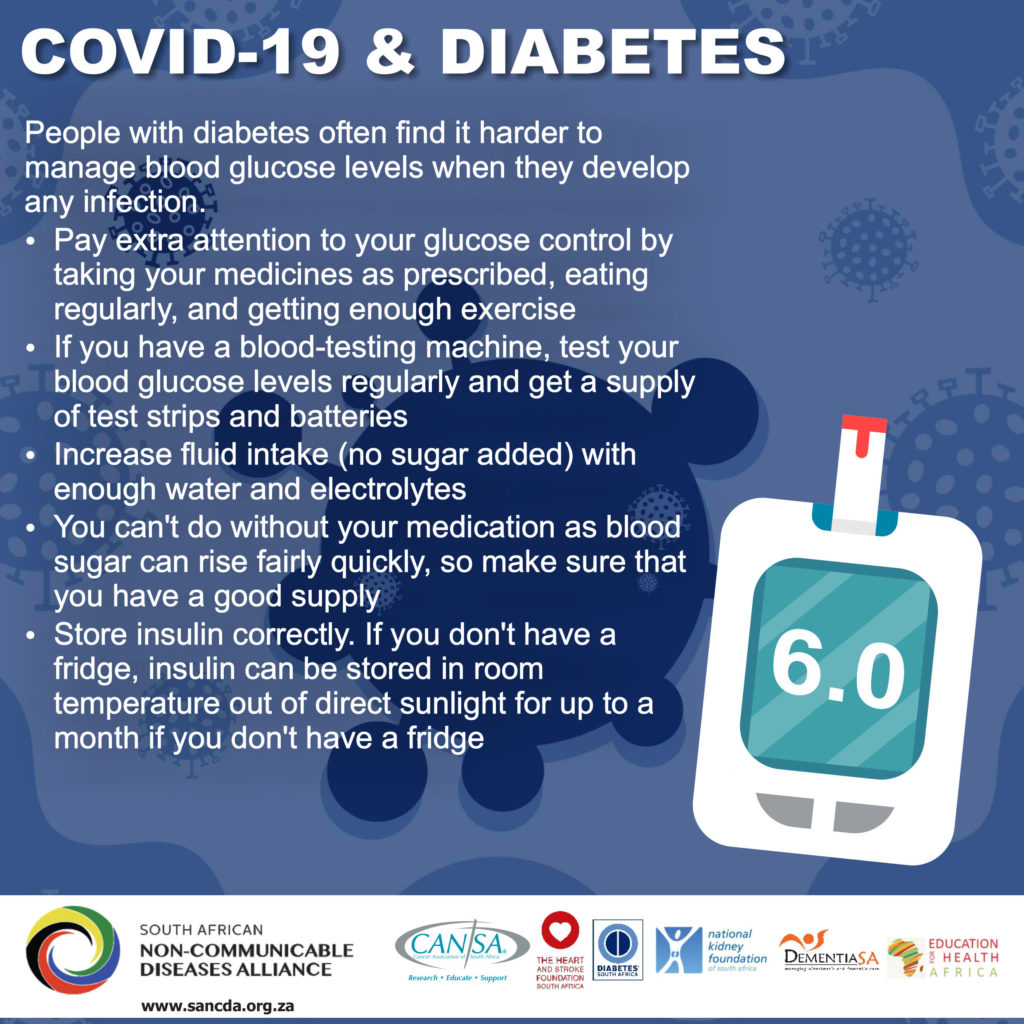
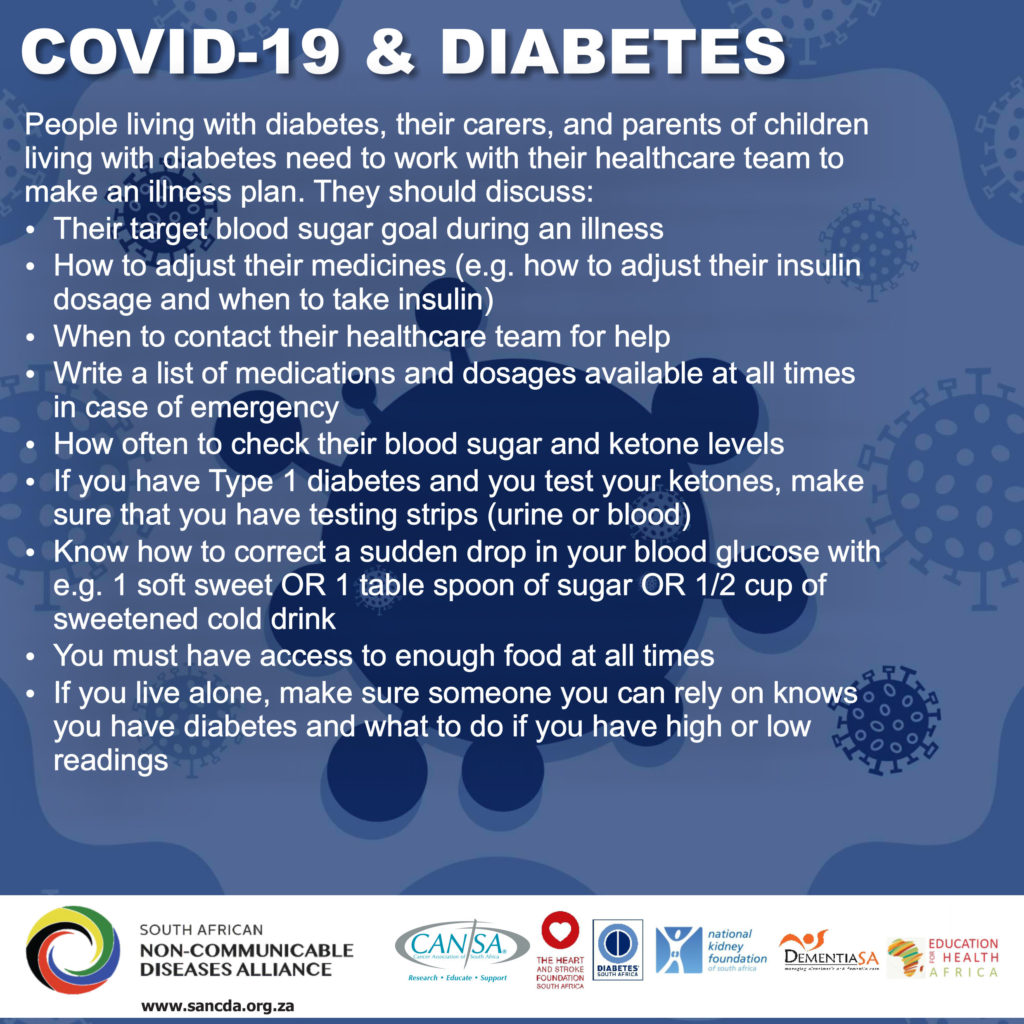
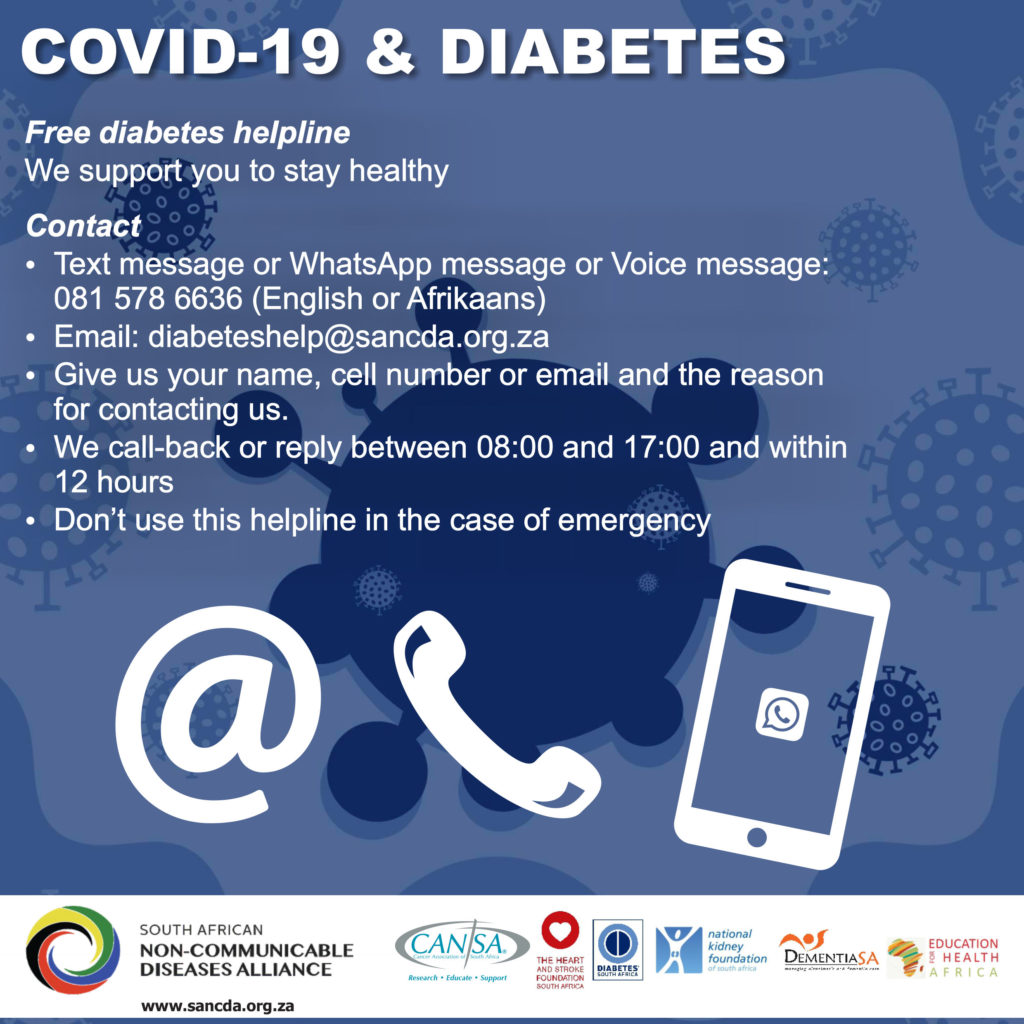
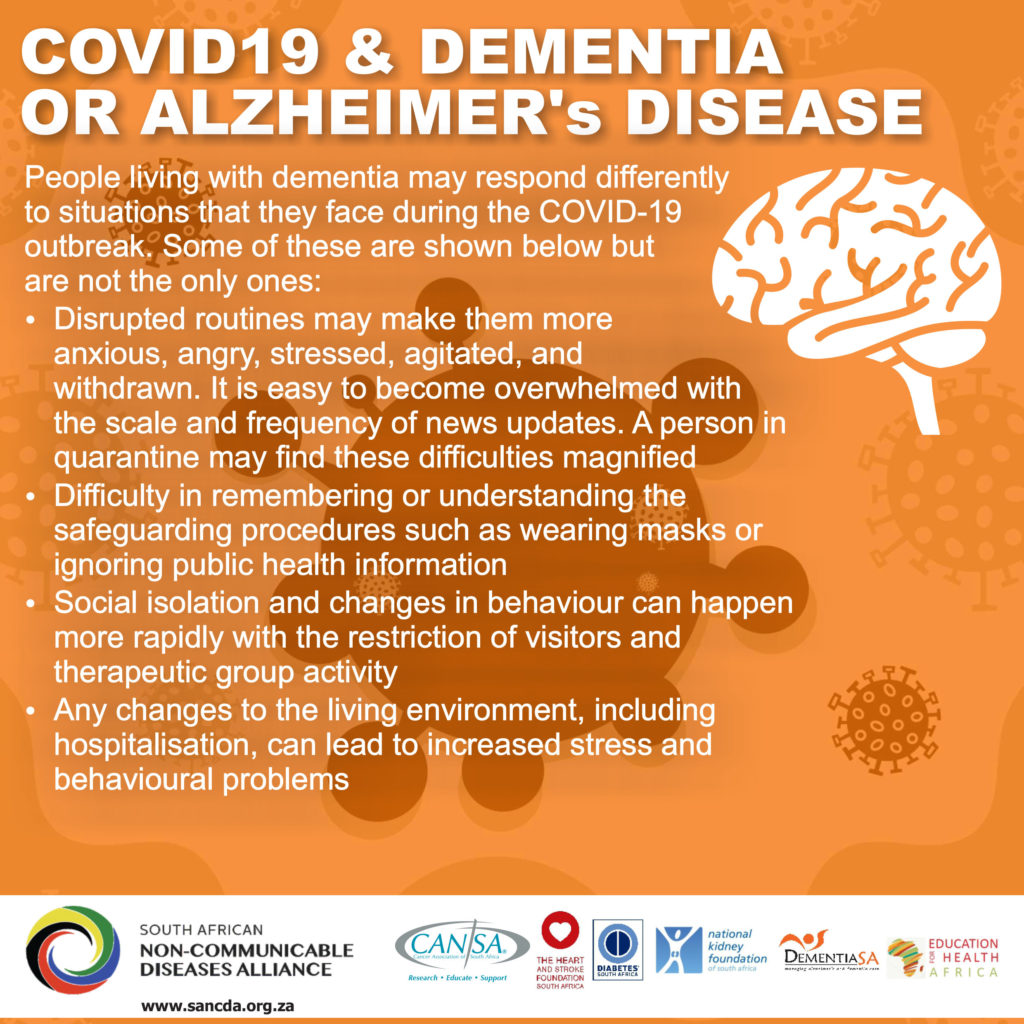
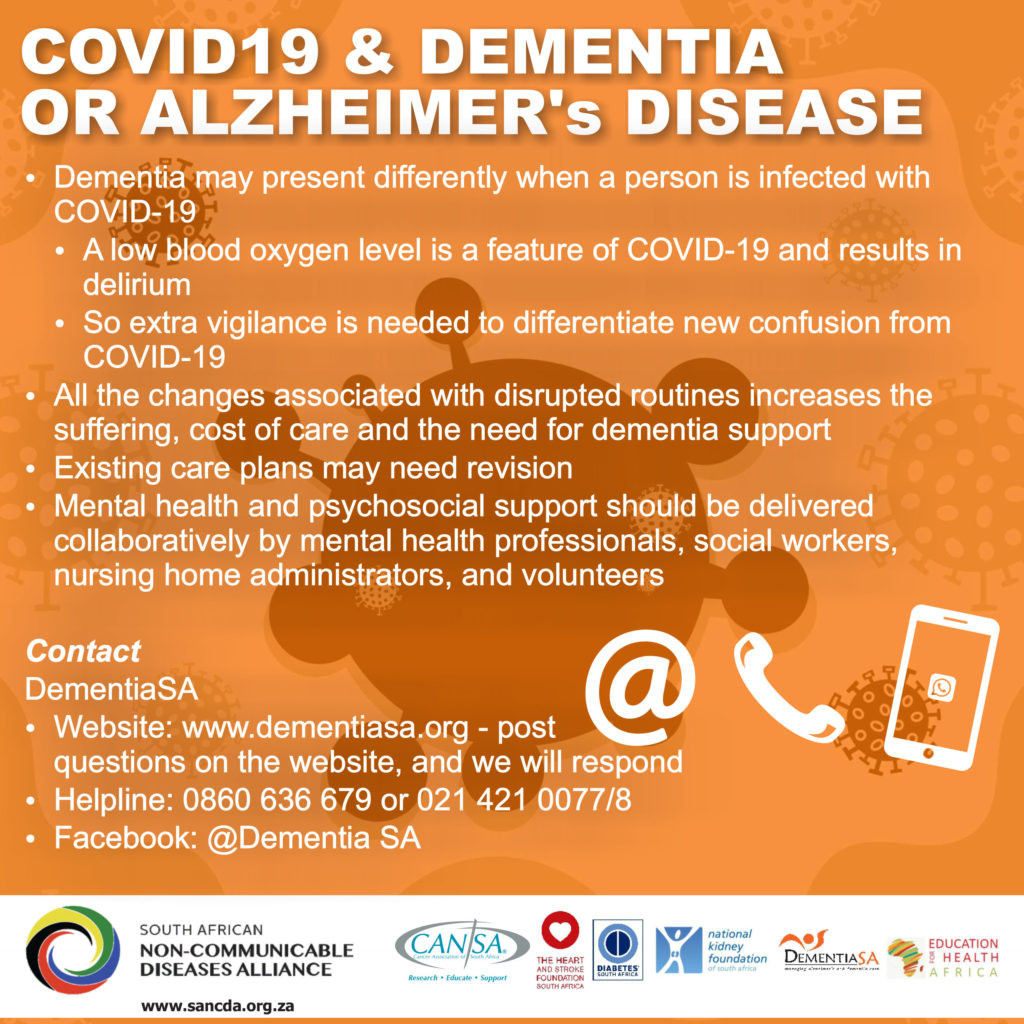
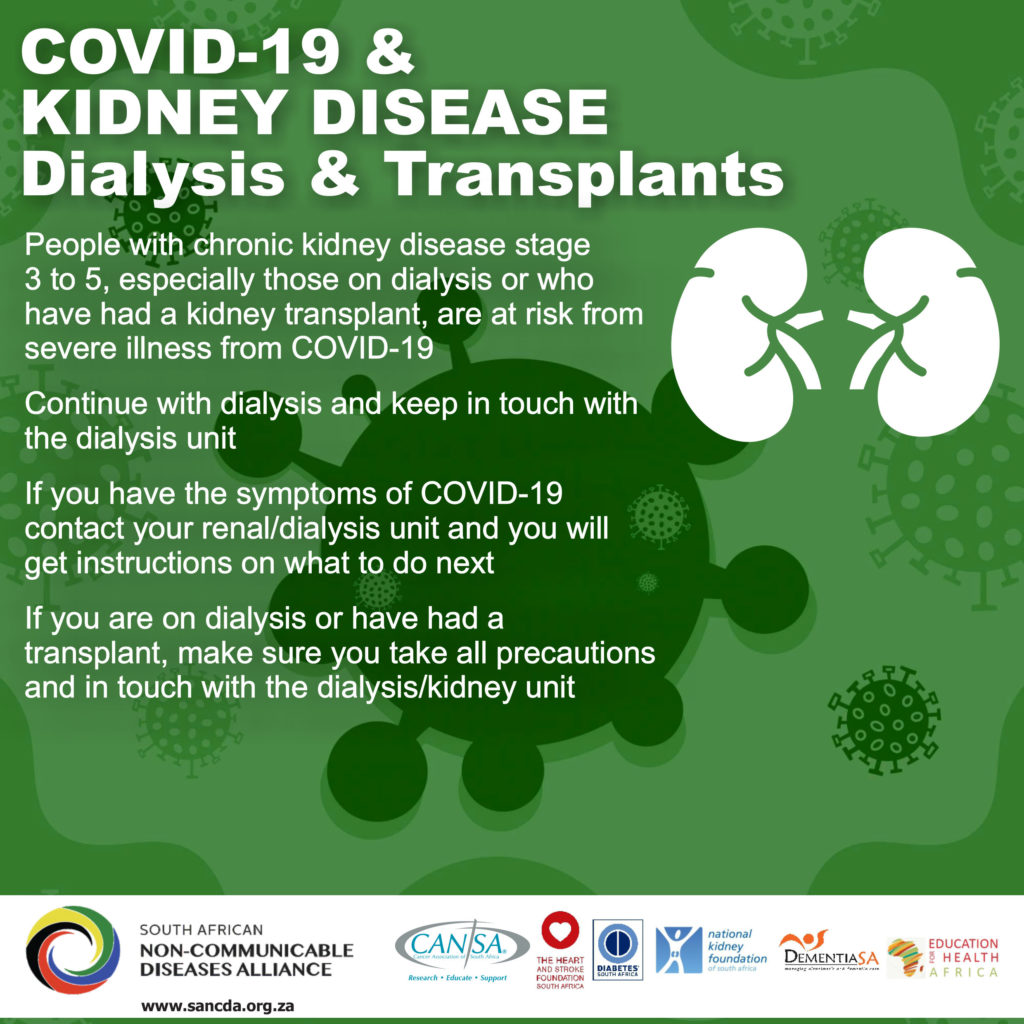
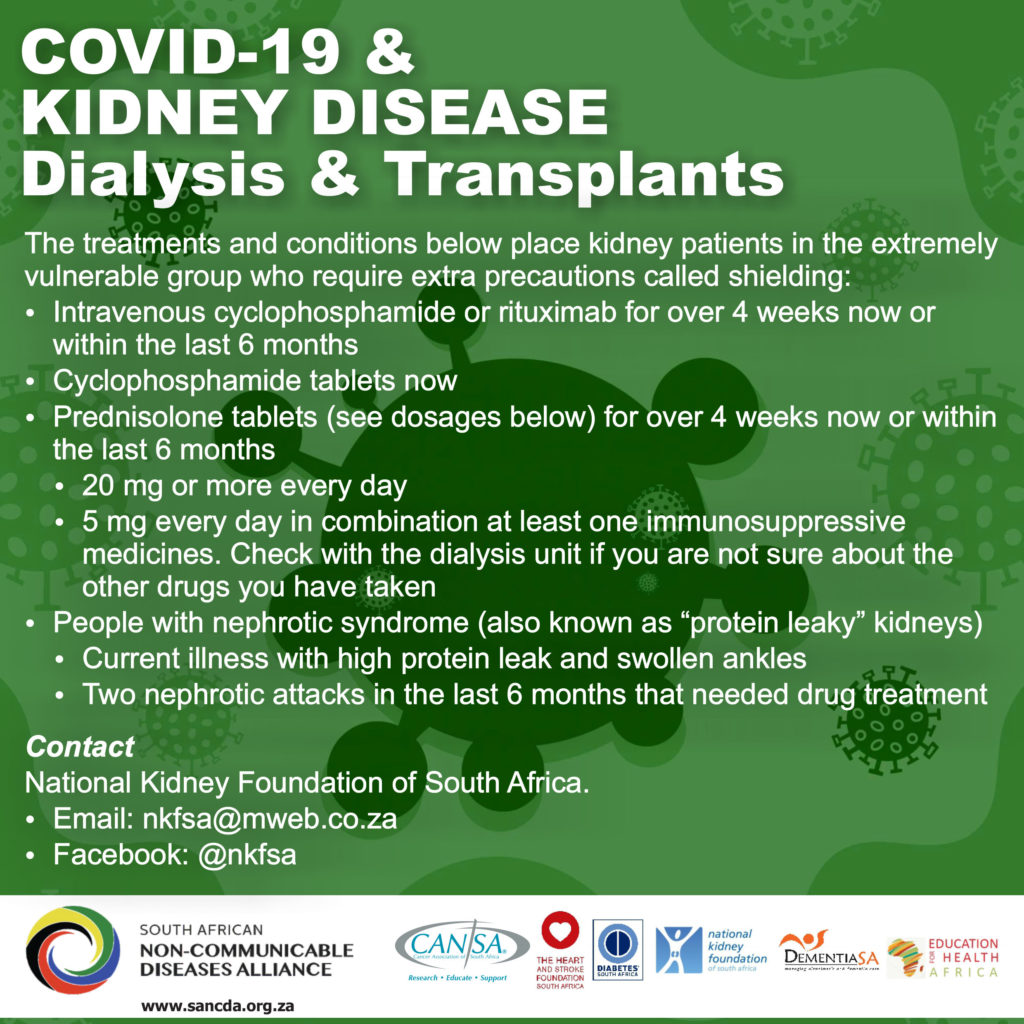
The Fix the Patent Laws Coalition (FTPL), a group of over 40 organisations working to reform South Africa’s patent laws, welcomes the progressive proposal by South Africa and India for a waiver of all intellectual property in respect of COVID-19 related diagnostics, therapeutics and vaccines. We have seen how a lack of access to COVID-19 medical tools threatens countries’ ability to respond to the virus, especially developing countries. We believe that this proposal will promote and expedite equitable access to all health technologies in all countries.
We call on all countries to support the proposal to the Trade-Related Aspects of Intellectual Property Rights (TRIPS) Council for a temporary waiver of all patents on products needed to test, treat or vaccinate against COVID-19, and to act with urgency. COVID-19 is a global health crisis, and one that affects working-class and poor people disproportionately. The world needs bold steps such as this that prioritise the needs of vulnerable populations above profits and above nationalism.
“While the waiver will not by itself lead to access to COVID-19 health technologies, it is an important step towards equitable access,” says Executive Director at SECTION27 and FTPL member Umunyana Rugege. “In South Africa, we would like to see the draft amendments to the Patents Act published without delay to ensure that the legal environment is readied for the introduction of a range of diagnostics, medicines and vaccines.”
The FTPL coalition has called on the South African government to take the following steps to help fight COVID-19:
The South African government has shown exemplary leadership on the world stage to ensure that developing and middle-income countries are not left behind while wealthy nations secure deals with pharmaceutical companies, and that monopolies do not stand in the way of widespread African access to COVID-19 vaccines. This is an important opportunity for countries to stand in solidarity and support the call that would ensure all countries stand to benefit from efforts to fight the pandemic.
South Africa’s leadership of the African Union and initiatives like the COVAX facility, and the Access to COVID-19 Tools Accelerator have put solidarity before nationalism, and FTPL is fully behind our government in its quest to protect public health and ensure equitable access to medical products.
FTPL has joined a global community of civil society organisations calling for the urgent adoption of the Waiver. You can read the letter from civil society here.
20 August 2020 – The South Africa Non-Communicable Diseases Alliance (SA NCDs Alliance) is raising concern over the systemic neglect of non-communicable conditions (NCDs) like obesity, diabetes, high blood pressure, cancer, asthma and mental health problems due to neglected NCDs prevention and treatment. Download infographics
Dr Vicki Pinkney-Atkinson, Director of SA NCD Alliance says, “People living with NCDs believe it’s a health right to have proper access to care and medicines, especially now during a time of pandemic. Before COVID-19, the NCDs group of conditions killed most South Africans and remained neglected within government policy and budgets. For so long the many millions of people living with NCDs have lamented, ‘it would be better if I had HIV, then I would get access to quality care and medicines.”
NCDs, called underlying conditions during COVID-19, cause most deaths in South Africa. Diabetes kills more women than any other single illness for many years. (1) Government media acknowledge that 90% of those who die following COVID-19 infection had one or more NCD. (2)
The early figures coming out of Wuhan showed that NCDs increased the risk of complications and dying. It was clear that survival depended on well-managed conditions such as diabetes. It immediately exposed the fault lines in NCDs care.
The aim is to get government to implement ongoing care for those living with NCDs by health workers during and beyond COVID-19. This includes ensuring adequate supply of medications that don’t involve travel and visits to facilities and making use of online and tools for consultations to minimise physical interaction and exposure.
The Alliance further proposes performance indicators to assess government’s response to COVID-19 and ongoing NCDs care such as maintenance of food and medicine supply chains, protection and support for vulnerable and neglected people and maintenance of usual health services.
“As South Africans went into lockdown in March, the SA NCDs Alliance initiated online support, counselling and information services to keep people healthy such as the diabetes care line. Those of us living with diabetes soon learned that optimal blood sugar control is the best way to survive a COVID-19 infection. However, getting care and a regular supply of medicines in the public sector involved a stark choice; get your medications or get the virus. Unlike for HIV and TB, a remote non-clinic supply point is a rare option. Insulin, absolutely critical to sustain life in diabetes, is only available at a hospital-level even if there is a clinic next door,” elaborated Pinkney-Atkinson.
Zodwa Sithole, Head of Advocacy for CANSA added, “Patients are feeling frustrated and despondent as they struggle to access vital support services. A cancer patient’s low immunity and high infection risk for COVID-19, results in anxiety and physical distancing and hygiene measures add to a feeling of isolation even as lockdown levels are eased. Part of the response was the launch of our CANSA Tele Counselling service offering free, confidential cancer-related telephonic counselling available in seven languages.”
Nosipho (3) puts the human face on the access issue. In late pregnancy, she always needs insulin and asthma medication. Being a savvy diabetic, she knows she is at risk and tries to avoid the minimum five-hour round trip to get her insulin in central Cape Town during the COVID-19 surge. She knows that the risk of infection is high by using public transport and the long waiting lines at the hospital. When asked, the government sectors were unable to offer a solution.
For other NCDs like cancer, there are implications of delaying any screening that can result in cancers being detected at a later stage and affecting treatment outcomes.
Pinkney-Atkinson concludes, “What works to keep diabetics and other people living with NCDs safe, is not a mystery. There is plenty of evidence, we need action to provide ongoing NCDs care during COVID-19. (4) During the COVID-19 pandemic and beyond, we must go beyond stopping the virus and our right to get our ongoing essential services safely. We need these drugs and supplies (needles and syringes) to stay alive.”
For more information, please contact Dr Vicki Pinkney-Atkinson, Director of SA NCD Alliance at email [email protected]
Call 083 38 38-159. Alternate contact is Lucy Balona, Head: Marketing and Communication at CANSA at email [email protected].
Call 011 616 7662 or mobile 082 459 5230.
References:
(1) Statistics South Africa. Mortality and causes of death in South Africa, 2016: Findings from death notification [Internet]. Pretoria; 2018 [cited 2018 Mar 28]. Available from: http://www.statssa.gov.za/publications/P03093/P030932016.pdf
(2) SA Government News Agency. SA COVID-19 cases rise to 3 034. SANews.gov.za. 2020;2
(3) Not her real name
(4) Young T, Schoonees A, Lachman A, Kalula S, Mabweazara S, Musa E, et al. Taking stock of the evidence. Cape Town: Better Health Programme South Africa; 2020. 50 p
NCDs are a large group of health conditions that are generally not spread from person to person and used to be called chronic illness until 2000 when the Millennium Develop Goals force a new definition. Often the 5 main NCDs groups of conditions are noted: diabetes, circulatory disorders, mental health, cancer, and chronic respiratory illnesses. However, there are many more conditions that do not get a mention. Globally NCDs conditions are responsible for 41 million deaths annually and they are leading cause of death in South Africa since 2013. Diabetes is the leading cause of death of South African women.
However, the NCDs agenda is not just about illness it goes to a whole of society and whole of government response and for this we need an expanded understanding, meaning, NCDs+. The expanded NCDs+ advocacy agenda includes prevention, vulnerable populations, stigma control and disability. NCDs+ has many determinants (social, economic, and commercial) that disproportionately impact poor people. The Sustainable Development Goals (SDGs) address NCDs+ and its inclusion as an equal part of universal health coverage. (National Health Insurance in South Africa).
The SA NCDs Alliance, established in 7 years ago, is a civil society partnership between three trusted NCDs advocacy organisations: CANSA, Diabetes SA and the Heart & Stroke Foundation SA.
Its mission is for the people of South Africa have equitable access to quality NCDs+ prevention and management within universal health coverage/ NHI.
For this important COVID-19 and NCDs+ advocacy project nearly 90 civil society organisations are collaborating:
Cancer Alliance South Africa
Dementia South Africa
Epilepsy South Africa
Global Mental Health Peer Network
Myalgic Encephalomyelitis/Chronic Fatigue Syndrome (ME/CFS) SA
National Kidney Foundation SA
Palliative Treatment for Children SA (PatchSA)
South African Disability Alliance
South African Federation for Mental Health
The SA NCDs Alliance’s goal in this programme it to ensure that the policy window of opportunity opened by the COVID-19 pandemic is used to make NCDs a priority in government policy through collaboration with NCDs civil society to put it on a par with HIV & TB. www.sancda.org.za
Diabetes helpline +27-81-578-6636
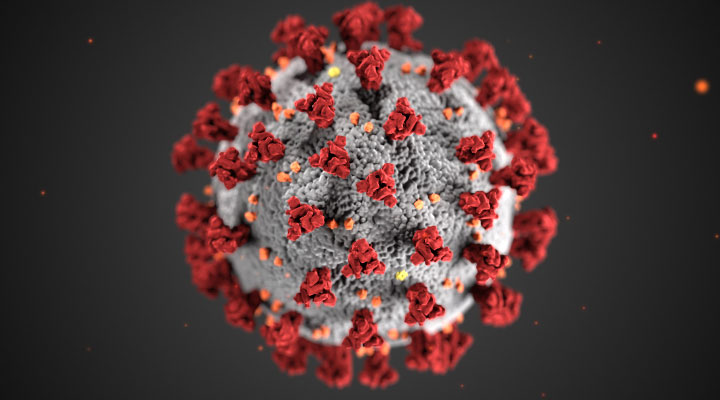
[vc_row][vc_column][vc_column_text]
20 civil society alliances in mainly low- and middle-income countries, including the South African Non-Communicable Diseases Alliance, were awarded grants to accelerate the response to the COVID-19 pandemic. The grants, made by the first Civil Society Solidarity Fund on Non-communicable Diseases (NCDs) and COVID-19, were announced today by the global NCD Alliance during a high-level online event.
Todd Harper, President of the global NCD Alliance, said: “The COVID-19 pandemic shows many intersections between COVID-19 and NCDs. People living with NCDs are more vulnerable to COVID-19, with a substantially higher risk of becoming severely ill or dying from the virus. The pandemic also impacts the poorest communities around the world and the most vulnerable people in every country. The civil society solidarity fund was born out of the need to tackle NCDs as fundamental to health security and to prevent a reversal of gains made in NCDs prevention and control around the world”.
The fund, totalling $300,000, competitively awarded grants of up to US$15,000 to national and regional NCD alliances. The purpose of the grants is to support alliances to address the critical needs of people living with NCDs during COVID-19 via advocacy and communication activities that will support stronger organisational stability and resilience.
Dr Vicki Pinkney-Atkinson, Director of SA NCDs Alliance, states: “Until the COVID-19 pandemic exposed the inequitable fault lines in the health system, NCDs+ are a neglected priority in South Africa. In South Africa, 99% of the people who have died because of COVID-19 are those of us living with NCDs+. The funding is a cause for celebration in an otherwise dark time with record daily number of new infections and deaths. It will allow the participation of people living with NCDs+ to building back a better health system with equity for NCDs prevention and treatment. We can work alongside the government to ensure that NCDs public health plans are equal to those for HIV and meet our needs.”
Katie Dain, CEO of NCD Alliance, added: “This is a first-of-its-kind fund to support NCD civil society organisations (CSOs) response to COVID-19. During pandemics, momentum in several health and sustainable development issues, notably HIV/AIDS, Ebola and climate change, have repeatedly reinforced the critical role of CSOs and community-led efforts in accelerating action from local to global levels. Civil society are proven campaigners, change agents, experts, implementers and watchdogs”.
The millions of South Africans living with NCDs+ are a critical at-risk, vulnerable group during COVID-19. No community is spared from the impacts of COVID-19 or NCDs, affecting rich and poor alike. The COVID-19 pandemic, despite its huge negative impact, offer a policy window of opportunity to work together to build a better health system and society free from the preventable suffering, disability, and death caused by NCDs.
The NCD Alliance Civil Society Solidarity Fund on NCDs and COVID-19 is possible thanks to generous financial contributions of global NCD Alliance’s supporters: The Leona M. and Harry B. Helmsley Charitable Trust, Access Accelerated, Takeda, AstraZeneca and Upjohn (Pfizer). The Fund received 45 submissions from national and regional alliances across all regions, which were reviewed by a selection committee. The Fund recognises the essential work of NCD advocates, which now becomes even more critical than ever to ensure political and media attention to the needs of people living with NCDs as one of the most vulnerable groups to COVID-19.
The recipients of the Civil Society Solidarity Fund are from Africa, Asia, Europe, Eastern Mediterranean and Latin America:
[/vc_column_text][/vc_column][/vc_row]
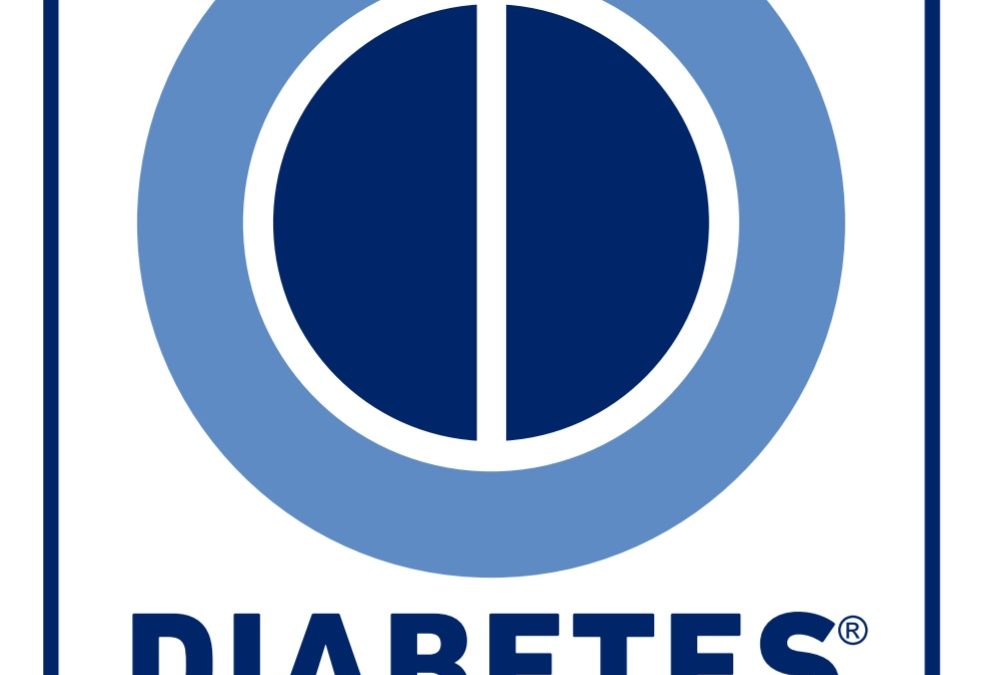
WHY? PLWD -People living with diabetes- who are infected have a higher chance of getting a serious form of COVOD-19. So we want you to stay healthy, on stay on your treatment plan and stay at home.
WHAT? We offer support to PLWD so that you can best self manage while preventing diabetes complications
WHO? A person with diagnosed diabetes on a management plan involving “lifestyle” +/or oral medicine +/or insulin.
HOW? Telehealth using text messages, email, phone +/or video consultations. To start the process message us:
Email: [email protected] or
text or voice +27-81-578-6636 (text or voice and WhatsApp or other messaging service)
TELL US: Your name, cell number or email, where you are staying, a few words about your diabetes challenge
WE REPLY: within 24 hours of getting your message and between 8am – 5pm 7 days a week.
Don’t use this service for emergencies or a sudden worsening of your health. Follow local instructions.
[/vc_column_text][/vc_column][vc_column][vc_single_image image=”7695″ img_size=”medium”][/vc_column][/vc_row]